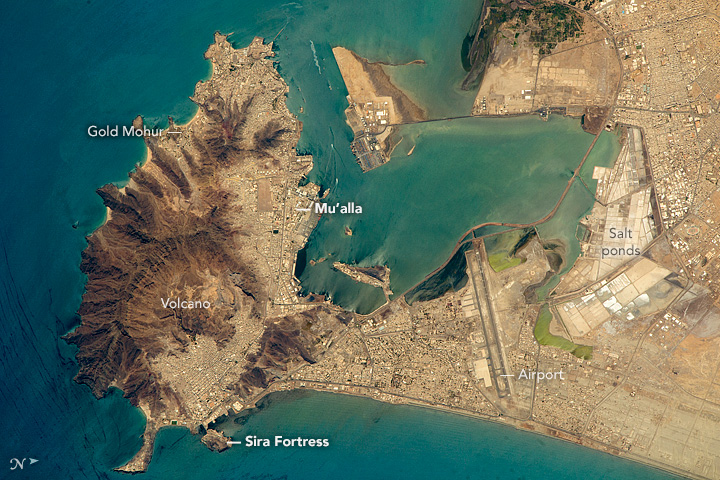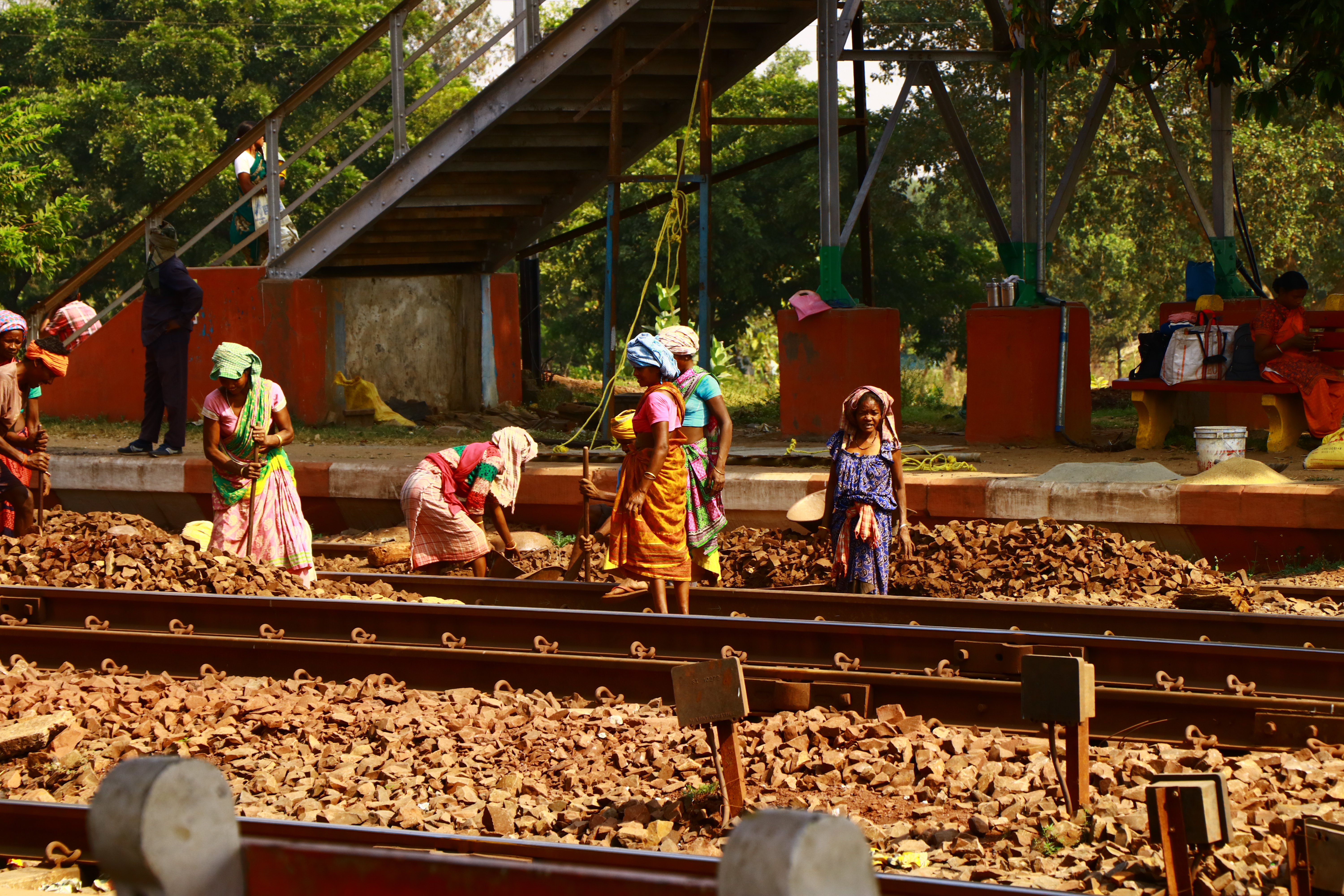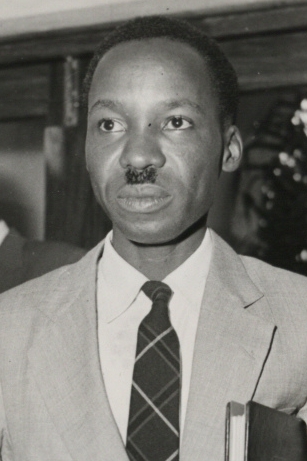|
Oscar Kambona
Oscar Salathiel Kambona (1925-1997) was the first Minister of Foreign Affairs of Tanganyika. He was arguably the second-most influential and most popular leader in the country after President Julius Nyerere. Kambona was born on 13 August 15 on the shores of Lake Nyasa in a small village called Kwambe near Mbamba Bay in the district of Nyasa near Songea in Ruvuma region southern Tanganyika. He died in London in November 1997. He was the son of the Reverend David Kambona and Miriam Kambona. Reverend David Kambona belonged to the first group of African priests to be ordained into the Anglican Church of Tanganyika. Kambona received his primary school education at home under a mango tree in his home village. The tree still stands today. He was taught by his parents and by an uncle, all of whom were teachers. He was then sent to St. Barnabas Middle School in Liuli in southern Tanganyika not far from his home. He also attended Alliance Secondary School in Dodoma in central Tanganyika ... [...More Info...] [...Related Items...] OR: [Wikipedia] [Google] [Baidu] |
Minister Of External Affairs (Tanzania)
The Minister of Foreign Affairs is the head of the Ministry of Foreign Affairs and International Co-operation (Tanzania), Ministry of Foreign Affairs and International Co-operation of the Government of Tanzania. List of Ministers The following have served the ministry: ; Parties References {{TZ Ministers Foreign ministers of Tanzania, * ... [...More Info...] [...Related Items...] OR: [Wikipedia] [Google] [Baidu] |
Aden
Aden ( ar, عدن ' Yemeni: ) is a city, and since 2015, the temporary capital of Yemen, near the eastern approach to the Red Sea (the Gulf of Aden), some east of the strait Bab-el-Mandeb. Its population is approximately 800,000 people. Aden's natural harbour lies in the crater of a dormant volcano, which now forms a peninsula joined to the mainland by a low isthmus. This harbour, Front Bay, was first used by the ancient Kingdom of Awsan between the 7th to 5th centuries BC. The modern harbour is on the other side of the peninsula. Aden gets its name from the Gulf of Aden. Aden consists of a number of distinct sub-centres: Crater, the original port city; Ma'alla, the modern port; Tawahi, known as "Steamer Point" in the colonial period; and the resorts of Gold Mohur. Khormaksar, on the isthmus that connects Aden proper with the mainland, includes the city's diplomatic missions, the main offices of Aden University, and Aden International Airport (the former British Roy ... [...More Info...] [...Related Items...] OR: [Wikipedia] [Google] [Baidu] |
Nnamdi Azikiwe
Nnamdi Benjamin Azikiwe, (16 November 1904 – 11 May 1996), usually referred to as "Zik", was a Nigerian statesman and political leader who served as the first President of Nigeria from 1963 to 1966. Considered a driving force behind the nation's independence, he came to be known as the "father of Nigerian Nationalism". Born to Igbo parents from Anambra State, Eastern Nigeria in Zungeru in present-day Niger State, as a young boy he learned to speak Hausa (the main indigenous language of the Northern Region). Azikiwe was later sent to live with his aunt and grandmother in Onitsha (his parental homeland), where he learned the Igbo language. A stay in Lagos exposed him to the Yoruba language; by the time he was in college, he had been exposed to different Nigerian cultures and spoke three languages (an asset as president). Azikiwe travelled to the United States where he was known as Ben Azikiwe and attended Storer College, Columbia University, the University of Pennsylvania ... [...More Info...] [...Related Items...] OR: [Wikipedia] [Google] [Baidu] |
Nigerian Civil War
The Nigerian Civil War (6 July 1967 – 15 January 1970), also known as the Nigerian–Biafran War or the Biafran War, was a civil war fought between Nigeria and the Republic of Biafra, a secessionist state which had declared its independence from Nigeria in 1967. Nigeria was led by General Yakubu Gowon, while Biafra was led by Lieutenant Colonel C. Odumegwu Ojukwu, Chukwuemeka "Emeka" Odumegwu Ojukwu. Biafra represented the nationalist aspirations of the Igbo people, Igbo ethnic group, whose leadership felt they could no longer coexist with the Federal government of Nigeria, federal government dominated by the interests of the Muslim Hausa-Fulanis of Northern Nigeria. The conflict resulted from political, economic, ethnic, cultural and religious tensions which preceded the United Kingdom's formal decolonization of Nigeria from 1960 to 1963. Immediate causes of the war in 1966 included 1966 Nigerian coup d'état, a military coup, 1966 Nigerian counter-coup, a counter-coup, and 19 ... [...More Info...] [...Related Items...] OR: [Wikipedia] [Google] [Baidu] |
Biafra
Biafra, officially the Republic of Biafra, was a partially recognised secessionist state in West Africa that declared independence from Nigeria and existed from 1967 until 1970. Its territory consisted of the predominantly Igbo-populated former Eastern Region of Nigeria. Biafra was established on 30 May 1967 by Igbo military officer and Eastern Region governor C. Odumegwu Ojukwu under his presidency, following a series of ethnic tensions and military coups after Nigerian independence in 1960 that culminated in the 1966 massacres of Igbo people and other Eastern ethnic groups living in northern Nigeria. The military of Nigeria proceeded to invade Biafra shortly after its secession, resulting in the start of the Nigerian Civil War. Biafra was formally recognised by Gabon, Haiti, Ivory Coast, Tanzania, and Zambia. Other nations, which did not officially recognise Biafra, but provided diplomatic or military support to Biafra, included France, Spain, Portugal, Norway, Israel, ... [...More Info...] [...Related Items...] OR: [Wikipedia] [Google] [Baidu] |
Yakubu Gowon
Yakubu Dan-Yumma 'Jack' Gowon (born 19 October 1934) is a retired Nigerian Army general and military leader. As Head of State of Nigeria, Gowon presided over a controversial Nigerian Civil War and delivered the famous "no victor, no vanquished" speech at the war's end in an effort to promote healing and reconciliation. The Nigerian Civil War is listed as one of the deadliest in modern history, with some accusing Gowon of crimes against humanity and genocide. Gowon maintains that he committed no wrongdoing during the war and that his leadership saved the country. An Anglican Christian from a minority Ngas family of Northern Nigeria, Gowon is a Nigerian nationalist, and a believer in the unity and oneness of Nigeria. Gowon's rise to power following the July 1966 counter-coup cemented military rule in Nigeria. Consequently, Gowon is the longest serving contiguous head of state of Nigeria, ruling for almost nine years until his overthrow in the coup d'état of 1975 by Bri ... [...More Info...] [...Related Items...] OR: [Wikipedia] [Google] [Baidu] |
Nigerian
Nigerians or the Nigerian people are citizens of Nigeria or people with ancestry from Nigeria. The name Nigeria was taken from the Niger River running through the country. This name was allegedly coined in the late 19th century by British journalist Flora Shaw, who later married Baron Frederick Lugard, a British colonial administrator. ''Nigeria'' is composed of various ethnic groups and Culture, cultures and the term Nigerian refers to a citizenship-based civic nationality. Nigerians derive from over 250 ethnic groups and languages.Toyin Falola. ''Culture and Customs of Nigeria''. Westport, Connecticut, USA: Greenwood Press, 2001. p. 4. Though there are multiple ethnic groups in Nigeria, economic factors result in significant mobility of Nigerians of multiple ethnic and religious backgrounds to reside in territories in Nigeria that are outside their ethnic or religious background, resulting in the mixing of the various ethnic and religious groups, especially in Nigeria's cities ... [...More Info...] [...Related Items...] OR: [Wikipedia] [Google] [Baidu] |
Low-paying Job
The working poor are working people whose incomes fall below a given poverty line due to low-income jobs and low familial household income. These are people who spend at least 27 weeks in a year working or looking for employment, but remain under the poverty threshold. In the US, the official measurement of the working poor is controversial. Many social scientists argue that the official measurements used do not provide a comprehensive overview of the number of working poor. One recent study proposed over 100 ways to measure this and came up with a figure that ranged between 2% and 19% of the total US population. There is also controversy surrounding ways that the working poor can be helped. Arguments range from increasing welfare to the poor on one end of the spectrum to encouraging the poor to achieve greater self-sufficiency on the other end, with most arguing varying degrees of both. Measurement Absolute According to the US Department of Labor, the working poor "are pers ... [...More Info...] [...Related Items...] OR: [Wikipedia] [Google] [Baidu] |
Dar Es Salaam
Dar es Salaam (; from ar, دَار السَّلَام, Dâr es-Selâm, lit=Abode of Peace) or commonly known as Dar, is the largest city and financial hub of Tanzania. It is also the capital of Dar es Salaam Region. With a population of over six million people, Dar is the largest city in East Africa and the List of urban agglomerations in Africa, seventh-largest in Africa. Located on the Swahili coast, Dar es Salaam is an important economic centre and is one of the fastest-growing cities in the world. The town was founded by Majid bin Said of Zanzibar, Majid bin Said, the first Sultanate of Zanzibar, Sultan of Zanzibar, in 1865 or 1866. It was the main administrative and commercial center of German East Africa, Tanganyika (territory), Tanganyika, and Tanzania. The decision was made in 1974 to move the capital to Dodoma and was officially completed in 1996. Dar es Salaam is Tanzania's most prominent city for arts, fashion, media, film, television, and finance. It is the capital ... [...More Info...] [...Related Items...] OR: [Wikipedia] [Google] [Baidu] |
Nairobi
Nairobi ( ) is the capital and largest city of Kenya. The name is derived from the Maasai phrase ''Enkare Nairobi'', which translates to "place of cool waters", a reference to the Nairobi River which flows through the city. The city proper had a population of 4,397,073 in the 2019 census, while the metropolitan area has a projected population in 2022 of 10.8 million. The city is commonly referred to as the Green City in the Sun. Nairobi was founded in 1899 by colonial authorities in British East Africa, as a rail depot on the Uganda - Kenya Railway.Roger S. Greenway, Timothy M. Monsma, ''Cities: missions' new frontier'', (Baker Book House: 1989), p.163. The town quickly grew to replace Mombasa as the capital of Kenya in 1907. After independence in 1963, Nairobi became the capital of the Republic of Kenya. During Kenya's colonial period, the city became a centre for the colony's coffee, tea and sisal industry. The city lies in the south central part of Kenya, at an elevation ... [...More Info...] [...Related Items...] OR: [Wikipedia] [Google] [Baidu] |
Kibbutz
A kibbutz ( he, קִבּוּץ / , lit. "gathering, clustering"; plural: kibbutzim / ) is an intentional community in Israel that was traditionally based on agriculture. The first kibbutz, established in 1909, was Degania. Today, farming has been partly supplanted by other economic branches, including industrial plants and high-tech enterprises. Kibbutzim began as utopian communities, a combination of socialism and Zionism. In recent decades, some kibbutzim have been privatized and changes have been made in the communal lifestyle. A member of a kibbutz is called a ''kibbutznik'' ( he, קִבּוּצְנִיק / ; plural ''kibbutznikim'' or ''kibbutzniks''). In 2010, there were 270 kibbutzim in Israel with population of 126,000. Their factories and farms account for 9% of Israel's industrial output, worth US$8 billion, and 40% of its agricultural output, worth over US$1.7 billion. Some kibbutzim had also developed substantial high-tech and military industries. For example ... [...More Info...] [...Related Items...] OR: [Wikipedia] [Google] [Baidu] |
Ujamaa
Ujamaa ( in Swahili) was a socialist ideology that formed the basis of Julius Nyerere's social and economic development policies in Tanzania after it gained independence from Britain in 1961. More broadly, ujamaa may mean "cooperative economics", in the sense of "local people cooperating with each other to provide for the essentials of living", or "to build and maintain our own stores, shops, and other businesses and to profit from them together". Ideology and practice In 1967, President Nyerere published his development blueprint, the '' Arusha Declaration,'' in which he pointed out the need for an African model of development and that formed the basis of ujamaa as policy. The Swahili word ''ujamaa'' means 'extended family', 'brotherhood'; it asserts that a person becomes a person ''through the people'' or community. The spirit of 'others' or 'community' bringing units of families together, and fostering cohesion, love, and service. Nyerere used Ujamaa as the basis for a n ... [...More Info...] [...Related Items...] OR: [Wikipedia] [Google] [Baidu] |



.jpg)



